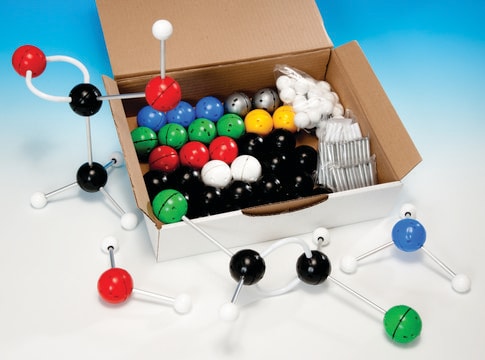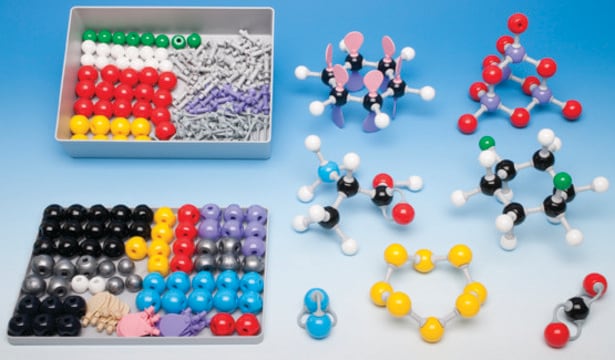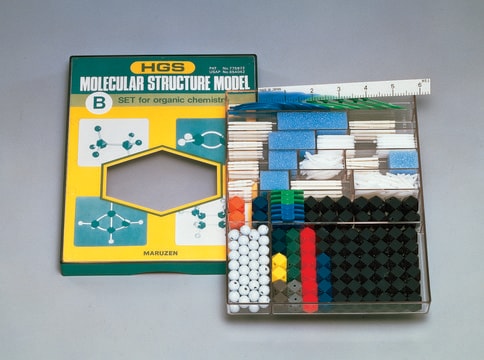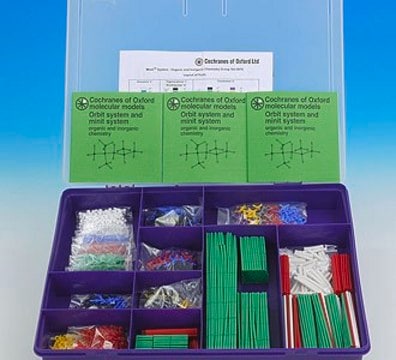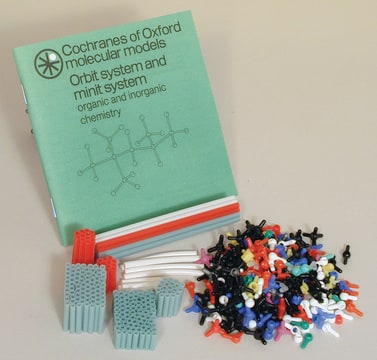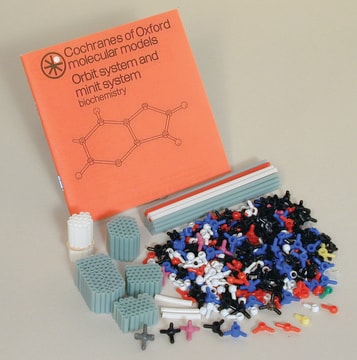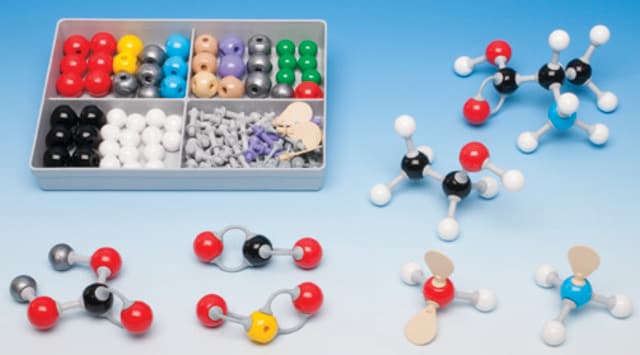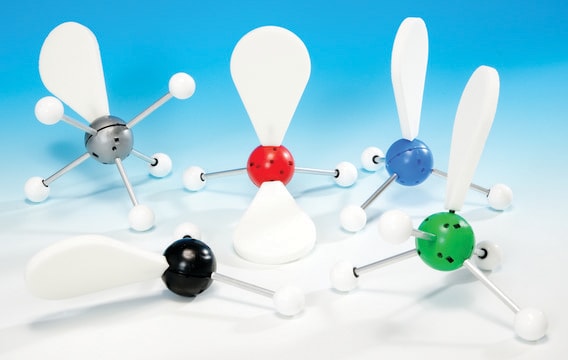Z119636
Cochranes molecular models
orbit, large set
Synonyme(s) :
chemistry model sets, molecular model sets
About This Item
Produits recommandés
Description
Scale: 2 cm = 0.1 nanometer (1 Å), Minit 3 cm = 0.1 nanometer (1 Å), Orbit
Caractéristiques
no. of atoms 1,260
no. of bonds 1,000
Fabricant/nom de marque
Cochranes 0041
Vous recherchez des produits similaires ? Visite Guide de comparaison des produits
Description générale
Please see Technical Information Bulletin AL-183 for a listing of these items, available on our website at sigma-aldrich.com
1260 atoms, 1000 bonds, 4 booklets
Premium compartmented storage boxes.
Scale: 3 cm = 0.1 nanometer (1 A), Orbit
ATOMS:
- 1-prong: Hydrogen, white (250), Nitrogen, blue (10), Oxygen, red (50), Fluorine, light green (10), Sulfur, yellow (10), Chlorine, green (10), Bromine, dark green (10), Iodine, dark green (10)
- 2-prong linear: Hydrogen, white (40), Carbon, black (5), Nitrogen, blue (5), Oxygen, red (20)
- 2-prong 100°: Sulfur, yellow (10)
- 2-prong 110°: Nitrogen, blue (10), Oxygen, red (120)
- 2-prong 120°: Nitrogen, blue (10)
- 3-prong 100°, 130°, 130°: Carbon, brown (3), Phosphorous, purple (10)
- 3-prong 108°, 120°, 132°: Carbon, black (20)
- 3-prong 108°, 126°, 126°: Carbon, black (20), Nitrogen, blue (20), Oxygen, red (10)
- 3-prong 114°, 123°, 123°: Carbon, black (20), Nitrogen, blue (20)
- 3-prong 120°: Carbon, black (100), Nitrogen, blue (50), Oxygen, red (20)
- 4-prong tetrahedral: Carbon, black (110), Nitrogen, blue (10), Oxygen, red (20), Phosphorous, purple (20), Sulfur, yellow (12), Halogen, green (30), Metal, silver (30)
- 6-prong octahedral: Carbon, black (6), Nitrogen, blue (4), Oxygen, red (14), Sulfur, yellow (5), Iron, grey (12), Halogen, green (20), Metal, silver (20)
- 5-prong trigonal bipyramid: Carbon, black (6), Nitrogen, blue (4), Oxygen, red (4), Phosphorous, purple (2)
- 8-prong cubic: Halogen, green (5), Metal, silver (20)
- 12-prong: Metal, silver (40)
- X pegs (30)
BONDS:
- Extra-thick, light grey, 5 cm (150)
- Extra-thick, light grey, 3.5 cm (250)
- Extra-thick, light grey, 3 cm (150)
- Extra-thick, light grey, 2 cm (200)
- Extra-rigid, grey, 3.5 cm (45)
- Rigid white, 5 cm (60)
- Rigid white, 3.5 cm (90)
- Rigid mixed, 21 cm (48)
- Very flexible white, 21 cm (6)
- Very flexible white, 5 cm (6)
Certificats d'analyse (COA)
Recherchez un Certificats d'analyse (COA) en saisissant le numéro de lot du produit. Les numéros de lot figurent sur l'étiquette du produit après les mots "Lot" ou "Batch".
Déjà en possession de ce produit ?
Retrouvez la documentation relative aux produits que vous avez récemment achetés dans la Bibliothèque de documents.
Les clients ont également consulté
Articles
Use our handy VSEPR chart to find the 3-D geometric VSEPR shapes of molecules and ions and learn about VSEPR theory and shapes.
Use our handy VSEPR chart to find the 3-D geometric VSEPR shapes of molecules and ions and learn about VSEPR theory and shapes.
Use our handy VSEPR chart to find the 3-D geometric VSEPR shapes of molecules and ions and learn about VSEPR theory and shapes.
Use our handy VSEPR chart to find the 3-D geometric VSEPR shapes of molecules and ions and learn about VSEPR theory and shapes.
Notre équipe de scientifiques dispose d'une expérience dans tous les secteurs de la recherche, notamment en sciences de la vie, science des matériaux, synthèse chimique, chromatographie, analyse et dans de nombreux autres domaines..
Contacter notre Service technique